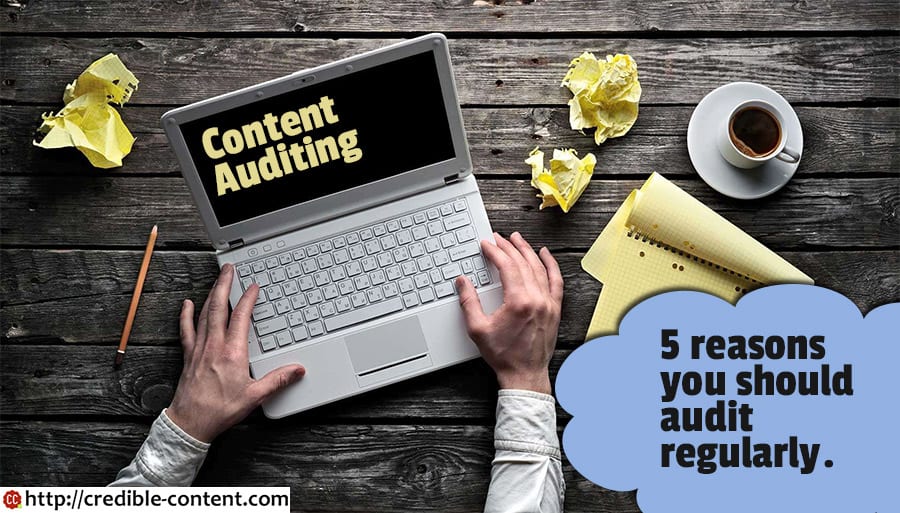You should definitely audit your website content if, one way or another, your company has been publishing content on its website and blog for a few months or for a few years.
Why is it important to update your website routinely?
It’s because there are big chances that when you published your content for the first time, you didn’t get it right.
Maybe you didn’t optimize it for the right keywords. Maybe you wrote the content (or got it written) in a hurry and didn’t pay much attention to optimization and conversion. Maybe there are lots of spelling mistakes because someone who wasn’t a proficient writer worked on your website content back in those days.
Maybe you need to update anyway because your content is now outdated.
When you decide to or agree to revise your web pages and blog posts it doesn’t mean so far you have had inferior-quality content. Just like your office needs regular maintenance, so does your website. In fact, I’m pretty sure in the past 5-10 years you must have redesigned your website or blog multiple times.
Click here if you are looking for website content auditing services.
The same goes for your content. What you thought back in 2008 might be totally different from what you think in 2017. Your content should reflect your thinking.
Where to start?
If you are auditing your website content for the first time it is but natural to wonder where to start?
What is content auditing and how to do it on your website
I use WordPress.org to manage my website and blog and there is a nice plug-in that allows me to export all the links into a text file that I later on import into an Excel sheet. You can create different columns to track your progress.
It is very important to know why your content exists. Does it simply fill up the pages because blank pages would look odd or does your content really have a purpose in life?
If you don’t know why you have published content on your website it will be very difficult to audit because then what’s the purpose of auditing it when you don’t know what to look for and what changes to incorporate to achieve what results?
So decide first.
Coming to a general question, why do people publish content on their websites?
Broadly there are two reasons:
- To have better SEO
- To have better conversion
Without content there is no SEO. It’s your content that tells the search engines what your website stands for.
For this you need to optimize your content using the right keywords. Whereas there is no need to obsess over your keywords, you should have a fair idea of what people are looking for on search engines to find businesses, products and services similar as yours.
You can decide for which keywords your chosen web page or blog post should get search engine traffic and then search for those keywords and see whether your link appears on the first or second page or not.
If it doesn’t, mark that link for a revision. Keep revising your links until they begin to rank well or at least you think that on the basis of your content, they should rank well. I say this because your rankings don’t just depend on your content; they also depend on the number of incoming links and many other factors.
So, before starting, prepare a list of keywords and search terms you think people are using to be able to find you (or your competitors).
Then you study how well the content converts. Is it able to convince people? Is your writing up to the mark? Is the tone professional as well as conversational? Do you have the right information? Are you linking to URLs that no longer exist or you shouldn’t be linking to?
Once you have all this information with you, you can start auditing your website content.
It can be a great advantage if you have been using something like Google Analytics to keep track of the traffic you are getting. Google Analytics tells you what sort of traffic is being drawn to your website. It will tell you if you are getting traffic for the right keywords or not. Google Analytics also tells you what links are getting traffic for what keywords.
5 reasons you should audit your website content
Although above I have briefly explained why you should routinely revise your website content, in this section I’m going to compile 5 reasons why it is beneficial to your online business that you routinely audit your website content and update it.
1. For repurposing your content
To stay ahead of your competition you constantly need fresh content. But content writing ideas are finite. Even content generation ideas for various formats are finite. But, you can get some new ideas from your existing content.
Go through your existing content and see if you can repurpose it – complete web pages and blog posts or some of their parts. Read How to repurpose old content.
2. For improving your SEO
Are your web pages and blog posts attracting traffic for the right keywords? If your important web pages and blog posts are not ranking well, maybe you can give it another try?
Maybe this time you can use a tool like Yoast or SEOPressor.
Maybe you could incorporate some longtail keywords. Maybe you can optimize the title and the description.
Maybe the first time when you created those web pages and blog posts you didn’t use alt tags with the images.
Maybe there are some inner web pages and blog posts you can interlink.
There are scores of things you can do to improve your SEO during your website content audit.
3. For improving visual appeal
This is something that I have been doing recently with my website content auditing. I’m revising almost all the web pages. I’m not happy with the images I have used with many web pages. So, I am now creating new images. In fact, I’m inserting many more images.
Previously I used to have just one image. Now I try to use at least 3-4 images.
The idea of using more attractive images came to me when I actively started using Instagram.
4. Improving overall quality
We are all constantly improving (at least I would like to think that). We learn new things. We realize that we have committed mistakes.
While auditing your website content you will realize that there are lots of quality gaps that can be filled. You can rewrite and rephrase paragraphs. You can remove unnecessary text. You can add some new text. You can make your paragraphs and sentences shorter. You can make the language simpler. You can remove difficult or needless words.
5. Streamline your information flow and structure
Even if your content is great, if it is not creating a story flow, it is not going to serve you well. For example, you have a home page or a landing page communicating a particular message. From there, are you linking to a page that takes your story forward. Have you organized your content according to your sales funnel? Is your content organized in a logical sequence? These things can only be improved if you have lots of content to audit.
Some content marketing experts believe that there is no sense in creating new content unless you have audited your existing website content, and I think this makes sense.
When you audit your website content you learn what you want to do and what you want to discard. If you don’t study your existing content you won’t realize what mistakes you are committing and then you will carry forward these mistakes into your new content.
How often should you audit your website content?
It depends on how much content you have. If you have thousands of web pages and blog posts it doesn’t make sense to audit them every month. Since auditing is an ongoing process, you can also mark web pages and blog posts that don’t need auditing so that the next time you audit your content, you know which links you shouldn’t bother with. Otherwise, I think once a year it should be sufficient enough to audit your website content.




